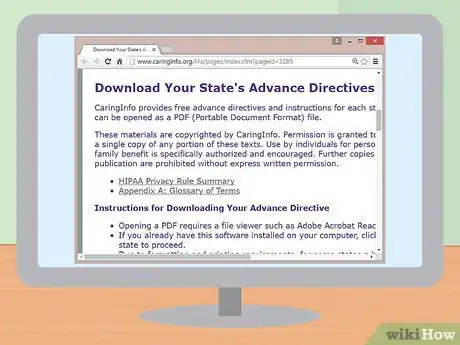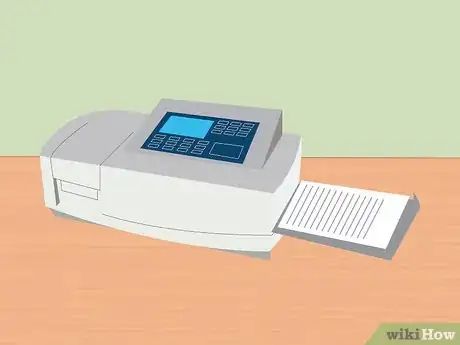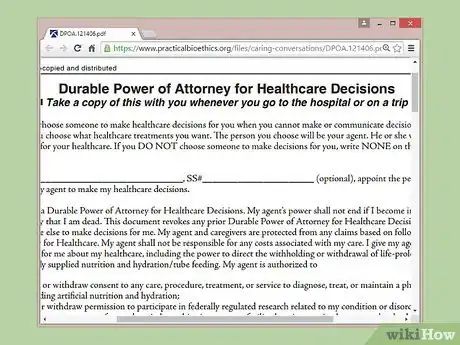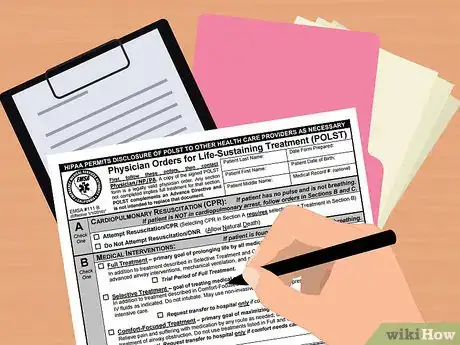This article was co-authored by Clinton M. Sandvick, JD, PhD. Clinton M. Sandvick worked as a civil litigator in California for over 7 years. He received his JD from the University of Wisconsin-Madison in 1998 and his PhD in American History from the University of Oregon in 2013.
There are 11 references cited in this article, which can be found at the bottom of the page.
This article has been viewed 39,215 times.
While it may be difficult to think about the end of our lives, most people should consider creating documents that specify their health care wishes and that create health care and financial decision-making proxies to carry out whose wishes if the person becomes incapacitated. This not only protects the individual but it makes it easier for loved ones to carry out a family member's wishes. These documents can include setting forth our medical wishes, the distribution of our estate, and assigning authority to loved ones so that they can manage your medical care and financial decisions.
Steps
Locating and Completing Living Will Forms
-
1Understand the purpose of a living will. A living will, also known as an advance directive or advance health care directive, is a document that allows you to set forth your wishes on the types of medical treatment that you want to receive at the end of your life. When considering a living will, you should note the following:
- Living wills are valid legal documents in the United States. Once you sign the document in front of the required witnesses, the living will goes into effect.
- States have different laws regarding living wills, so you must comply with your state’s guidelines in order for the document to be effective.
- Some states will not honor a living will from another state. If you spend a significant amount of time in another state, consider having living wills for each state that comply with the laws for the respective state.
- Living wills do not expire, however destroying your living will or changing your living will invalidates your previous document.[1]
-
2Locate state-specific living wills. As every state has its own requirements for living wills, it is important that you use a living will form that is specific to the state(s) in which you reside. You can acquire state-specific living will forms from the following:
- National Hospice and Palliative Care Organization. This organization provides state-specific living will forms and instructions. You can locate your state information here: http://www.caringinfo.org/i4a/pages/index.cfm?pageid=3289
- Ask your doctor or hospital for the forms. Hospitals often provide living will and health care directive forms, which they suggest patients fill out before major surgeries or during hospital stays.
- State bar associations or medical associations sometimes provide links to state-specific living will forms. To locate a bar or medical association, conduct an internet search that contains the name of your state and either “bar association” or “medical association” and “living will.” This should direct you to the appropriate resources.
- Search on the Department of Health website for your state. Many states provide living will and power of attorney forms that are downloadable and printable from their government website. You can locate the Department of Health website for your state by conducting an internet search for the name of your state and “Department of Health.” Once you locate the appropriate website, look for a search window on the website and search for “living will.”
Advertisement -
3Download the living will form. Once you have located a living will form for your state, you should download the document onto your computer and print it out.
-
4Review the living will form. Carefully read through the living will form and all instructions to see what additional steps you may need to take before a living will can go into effect. For example, you may need to sign the document in front of witnesses.
-
5Consider what types of medical treatment you want at the end of your life. Before filling out any forms, you should take some time and think about how you want to spend the end of your life. Some issues to consider include:
- Do you want to live only if you can be independent? Independence may mean that you are able to feed, dress and clothe yourself, bathe on your own and use the lavatory on your own.
- Is there a point at which you would no longer want to prolong your life? In answering this question, some people may state that they do not want to have a machine breathe for them or receive nutrition through a tube. Remember, a living will goes into effect when you are no longer able to make your own health care decisions.
- Do you want life-extending treatment regardless of your prognosis? You should think about whether you want medical professionals to extend your physical life regardless of whether you can recover from your medical condition. For example, this may include providing you life-sustaining treatment even if you have limited or no brain activity.[2]
-
6Discuss your end of life wishes with your doctor, family and close friends. When preparing to complete a living will form, you should discuss your end of life medical care wishes with your doctor, family, and friends. By discussing your wishes and plans to complete a living will, you allow your family and doctor the opportunity to understand the reasoning behind your decisions. This may help prepare them to follow through with your wishes if you become unable to make your own medical decisions.[3]
-
7Complete the form. While all states have different requirements, most living will forms will ask you to include the following information:
- Your wishes regarding life-prolonging medical care if you are diagnosed with an incurable disease or illness. This may include whether you want doctors to perform CPR, put you on a ventilator, or provide you will a feeding tube or antibiotics.
- Your decision about becoming an organ donor and what organs you would be willing to donate.
- Your choice for a health care proxy. Some states include this in the living will and others require you to complete a separate durable power of attorney for medical decisions (see below). A health care proxy is the person you choose to make medical decisions for you, if you become unable to make those decisions for yourself.[4]
-
8Execute the living will properly. Be sure that you follow your state’s rules about how to finalize your living will. For example, state laws may require that you and your witnesses sign the document before a notary public. To review state-specific laws on living wills go to: http://www.nolo.com/legal-encyclopedia/living-will-health-care-power-of-attorney-in-your-state-31011.html
-
9Provide copies of your living will. Once you have properly finalized the document, consider providing copies of your living will to the following:
- Family members.
- Health care proxy or agent.
- Personal doctor.
- Hospitals where you are undergoing treatment or surgery.[5]
Obtaining a Last Will and Testament
-
1Use will creation services. Some people may not want to hire an attorney but do not feel comfortable drafting their own will in its entirety. There are a number of services and products that you can use to assist in making a valid will. These include:
- Downloadable will templates. From the internet, you can download free will templates or purchase state-specific will forms. You can locate these forms by conducting an internet search for “last will and testament forms.” This search will return both free and for-pay services.
- Purchase will creation software. You can purchase software that will ask you questions and generate a finished will for you. You can locate this software through online retailers or you may be able to find this software at large bookstores.
- Use online will creation software. Similar to purchasing software, you can use online will programs that will also ask you questions and then produce a finished will based on your answers. You can conduct an internet search for “best online will programs” and determine which service is best for you.[6]
-
2Consider hiring an attorney. You should consider hiring an estate attorney to draft your last will and testament. An experienced attorney will be able to draft a will that sets forth your wishes regarding the distribution of your assets , the appointment of a legal guardian for minor children, the establishment of a trust, and address other estate-planning concerns.[7]
-
3Locate an estate attorney in your area. Estate attorneys draft wills and other estate-related documents. You want to find an experienced and reputable attorney that can draft your last will and testament. You can locate attorneys in a number of ways, including:
- Referral from friend or family member. If someone you know used an estate attorney, you can ask them whether they would recommend that attorney. A recommendation from a trusted person who has personal experience with an attorney is a good place to start.
- Local or state legal bar associations. Local and state bar associations often provide referral services to attorneys in your area. Through state bar associations, you can check whether any complaints were filed against your prospective attorney. The American Bar Association has compiled a list of state-by-state resources that can direct you to attorney referral sites, such as contact information for state bar associations. The ABA provides this information at https://www.americanbar.org/groups/legal_services/flh-home/
- Meet with your attorney and discuss your wishes. Once you have retained an attorney, you will meet with your attorney and discuss the specific wishes that you want included in your last will and testament. Your attorney will prepare your will and may bring you into his/her office to sign the documents in front of witnesses and a notary public. The attorney may also maintain a copy of your will.
-
4Write your own will. Some people who are adept at law or who have a very simple estate, with no minor children, may decide to write their own last will and testament. If you choose to write your own will, you should think about the following:
- Every state has its own laws regarding what must be contained in a valid will. To ensure that the will you draft follows your state’s requirements, you should review your state’s laws here:http://statelaws.findlaw.com/estate-planning-laws/wills.html
- Most states require that you sign your will, in front of two witnesses and often in front of a notary public.[8]
- Most wills set forth: how to distribute your property; the name of your executor; guardians for minor children; how to pay your debts and taxes; and who will care for your pets.[9]
Considering Additional End of Life Planning Documents
-
1Consider creating a power of attorney for health care. A medical power of attorney is a document in which you appoint a person to make health care decisions for you. This person only steps in if you become unable to communicate your own medical wishes or understand the medical decisions that need to be made. In deciding whether to create a power of attorney for health care, you should consider the following:
- Some states combine living wills an durable power of attorney for health care into one document.
- Some states restrict who can act as a health care proxy.[10] For a list of state restrictions go to: http://www.nolo.com/legal-encyclopedia/state-restrictions-health-care-agents.html.
-
2Download power of attorney for health care forms. You can download health care power of attorney forms from the internet. When downloading the forms, be sure that you are following the instructions for your state of residence. You can find health care power of attorney forms at the following:
- American Bar Association created a guide with state-specific forms to assist you in drafting a health care power of attorney. The guide can be found at: https://www.americanbar.org/content/dam/aba/administrative/staff-diversity-council/multi-state-hcpaform-final.authcheckdam.pdf
- Center for Practical Bioethics provides a general form located at: https://www.practicalbioethics.org/files/caring-conversations/DPOA.121406.pdf
- Conduct an internet search for “health care power of attorney” and the name of your state. You should be sure to download the state-specific form from a reputable website such as a state government website or state bar association.
-
3Consider creating a durable financial power of attorney. A financial power of attorney is a document that assigns a person the power to manage your finances. You can choose when the financial power of attorney goes into effect, such as if you become incapacitated. Without this document, your family may have to go to court in order to manage all or part of your finances. You can specify what powers your designated agent has under the power of attorney, including:
- Pay your bills using funds from your bank accounts.
- Pay property taxes.
- File your income taxes on your behalf.
- Collect and deposit your Social Security and Medicare checks.[11]
-
4Create a durable financial power of attorney form. Your financial power of attorney form must comply with state laws. When downloading forms from the internet, be sure that you are following the instructions for your state of residence. You can find a financial power of attorney form in the following ways:
- Conduct an internet search for “financial power of attorney” and the name of your state. You should be sure to download the state-specific form from a reputable website such as a state government website or state bar association.
- Compare the downloaded form to your state’s legal requirements. You can find state-specific laws regarding financial power of attorneys at: http://www.nolo.com/legal-encyclopedia/financial-power-of-attorney-in-your-state-31010.html
-
5File beneficiary forms. Once simple way to assist your heirs at the end of your life is to fill out beneficiary forms for bank accounts, retirement plans and life insurance policies. By designating a beneficiary, these funds can skip the probate process and be turned over quickly to your beneficiaries after you die.[12] You can locate beneficiary forms in the following ways:
- For bank accounts, go to the branch where you opened the account and request a beneficiary form or state that you want to create a “payable-on-death account.” By designating a beneficiary, the proceeds of your account will bypass probate and be distributed directly to your named beneficiary.[13]
- For life insurance policies, many large insurance companies and employers allow you to download the “beneficiary designation forms” from the internet. Conduct an internet search for “beneficiary designation forms” and the name of your insurance company and see whether you can easily access the document. If your life insurance is through your work, ask human resources for the form. You can also contact your life insurance company directly and request the form.
- For retirement plans, you typically fill out the form when you open the account. If you want to change or add a beneficiary, and your retirement plan is through your work, ask human resources for the form. You can also contact the manager of your retirement account directly and request the form.
-
6Fill out a Physician Orders for Life Sustaining Treatment (POLST) form. POLST is a specific form that a number of states offer in order to help make your healthcare wishes known. However, not every state has a POLST program, so be sure to make sure your state takes part in it.[14] If you live in a state that has a POLST program, you will be able to fill out the appropriate form and file it with a state registry.
- The first step in documenting your healthcare wishes is to talk with your physician about POLST. Your physician will ask you about the types of care you want and those you do not want.
- After you talk with your healthcare team, your physician will fill out your state's POLST form. You cannot fill out your POLST form on your own and your doctor will have to sign the form once it is completed.
- The form will ask about whether you want CPR, what type of medical intervention you want should you ever need it (e.g., comfort measures only, limited treatment, or full treatment), and whether you want artificially administered nutrition.
- Once your form is completed, you will receive an original copy that you should place on your refrigerator or in your medicine cabinet. If an emergency occurs, emergency personnel will look in thee places for your form.
- You can also choose to have your form filed with your state's POLST Registry. If you do so, medical personnel will be able to look up your information if they cannot find your form.
References
- ↑ http://www.caringinfo.org/i4a/pages/index.cfm?pageid=3285
- ↑ http://www.mayoclinic.org/healthy-lifestyle/consumer-health/in-depth/living-wills/art-20046303
- ↑ http://www.mayoclinic.org/healthy-lifestyle/consumer-health/in-depth/living-wills/art-20046303
- ↑ http://www.caringinfo.org/files/public/ad/New_York.pdf
- ↑ http://www.nolo.com/legal-encyclopedia/how-write-living-will.html
- ↑ http://www.nolo.com/legal-encyclopedia/how-write-will.html
- ↑ http://www.nolo.com/legal-encyclopedia/simple-wills-basics-29917.html
- ↑ http://www.nolo.com/legal-encyclopedia/how-write-will.html
- ↑ http://www.nolo.com/legal-encyclopedia/how-write-will.html
- ↑ http://www.nolo.com/legal-encyclopedia/living-will-power-of-attorney-29595.html
- ↑ http://www.nolo.com/legal-encyclopedia/durable-financial-power-of-attorney-29936.html
- ↑ http://www.nolo.com/legal-encyclopedia/12-simple-steps-estate-plan-29472.html
- ↑ http://www.nolo.com/legal-encyclopedia/free-books/avoid-probate-book/chapter1-1.html
- ↑ http://www.polst.org/programs-in-your-state/
About This Article
To get living will forms, look for your state-specific living will forms on the National Hospice and Palliative Care Organization website or your state’s Department of Health website. You can also ask your doctor or hospital for them. For a last will and testament, download templates from the internet, which may be free or for purchase, or use will creation software. If you need additional help preparing your documents, you might want to consider hiring an estate attorney. For more information from our Legal co-author, including how to complete and execute a living will form, read on!













































































